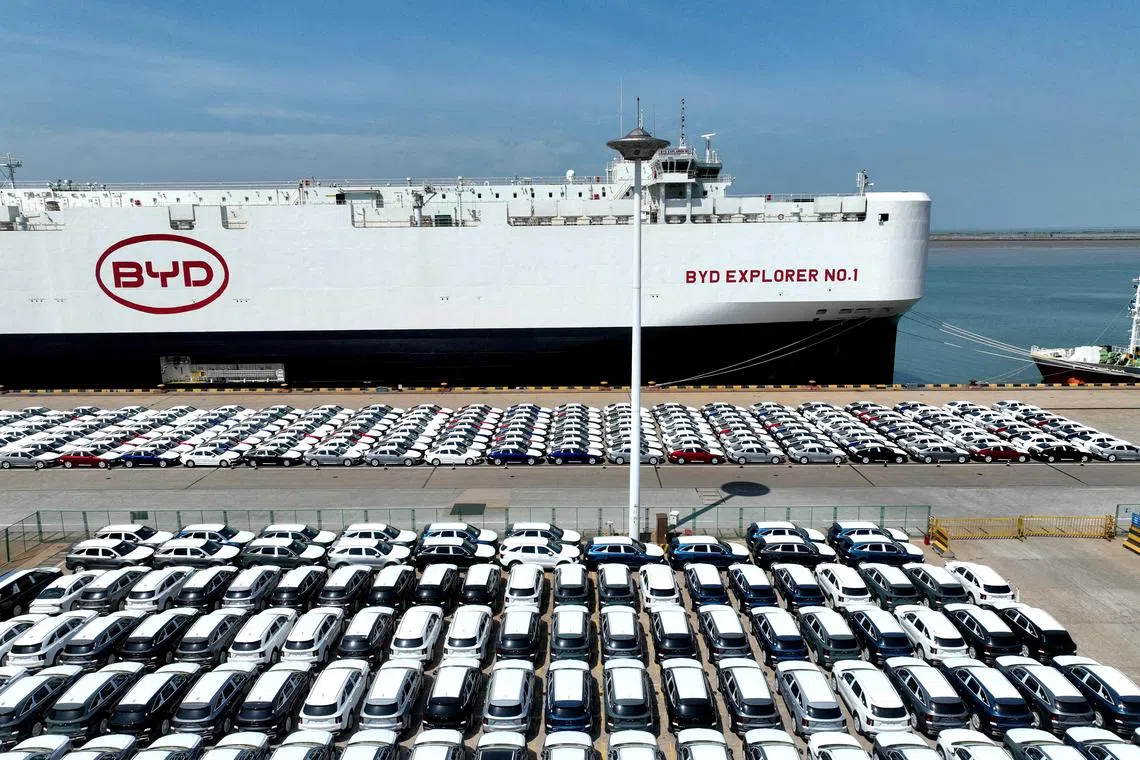Success of Chinese EVs a result of ‘fine entrepreneurial spirit’, says Premier Li Qiang
Sign up now: Get insights on Asia's fast-moving developments

China overtook Japan in 2023 to become the world’s largest auto exporter, driven by the success of its electric cars.
PHOTO: REUTERS
BEIJING – Chinese Premier Li Qiang countered allegations that China’s electric vehicle (EV) makers have benefited from unfair subsidies, attributing their strong performance to a “fine entrepreneurial spirit” instead.
The success of China’s emerging industries, including green technology, was rooted in the country’s “unique comparative advantages”, he said at the World Economic Forum meeting in China’s Dalian on June 25.
These include a super-sized market of 1.4 billion people, a complete industrial system, and a wide and diverse talent pool, he added.
Furthermore, Chinese consumers “are more receptive to new technologies”, and this has fuelled the emergence of the country’s innovative firms, he added. “That is how China’s emerging industries get their competitiveness.”
China overtook Japan in 2023 to become the world’s largest auto exporter, driven by the success of its electric cars.
But Chinese EV companies have come under scrutiny by foreign governments, including the European Union, the United States and, most recently, Canada, on fears that their markets are being flooded with cheap – subsidised – Chinese EVs to the detriment of local manufacturers.
On June 25, Canadian Finance Minister Chrystia Freeland said the country’s local auto industry has been facing “unfair competition from China’s intentional, state-directed policy of overcapacity”.
A public consultation is now under way before the government decides in July whether a clampdown on Chinese-made electric vehicles is needed.
The EU said on June 12 that it will hike tariffs on Chinese EVs to 38.1 per cent,
On June 25, Mr Li said that China, just like all countries, had taken “exploratory steps” to develop “frontier technologies and industries with the potential of explosive growth”, such as new quality productive forces.
The term “new quality productive forces”
Mr Li said: “China has been working hard to advance science and technology innovation. We encourage companies to be first movers and make continuous investments in cutting-edge fields.
“Now, after years of cultivation, a number of enterprises and industries in China have gained an edge internationally,” he added.
For example, Chinese carmakers have “not only met domestic demand, but also enriched supply in international markets”, he said.
Chinese electric cars have “eased off inflation pressures worldwide, and (they are China’s) active contribution to the global climate response”, he added.
China has also been motivated to grow its green energy industry to meet its goals of carbon peak by 2030 and neutrality by 2060.
Beijing “has been doing our best to foster a market-oriented, world-class business environment within a sound legal framework and, to that end, we have been abolishing regulations that limit market access and fair competition”, Mr Li said.
He also said in his 20-minute speech that China is on track to hit its growth target of about 5 per cent in 2024,
The International Monetary Fund expects China to grow by 5 per cent in 2024, outpacing the 3.2 per cent that it is projecting for global growth.
China is due to release its half-year gross domestic product growth in July.
Mr Bo Zhengyuan, a partner at research consultancy Plenum in Shanghai, said that while it was true Chinese carmakers had their baptism of fire in the “ruthless China market, overseas governments will not take that into account”.
He said Mr Li’s speech will not help to ease trade tensions between China and major governments in the West.
But he does not expect growing trade tensions to impede China from hitting its growth target for 2024 on the back of strong exports.
“The additional tariffs that the EU has announced have not been that high to hurt Chinese electric carmakers’ advantage,” Mr Bo said.



